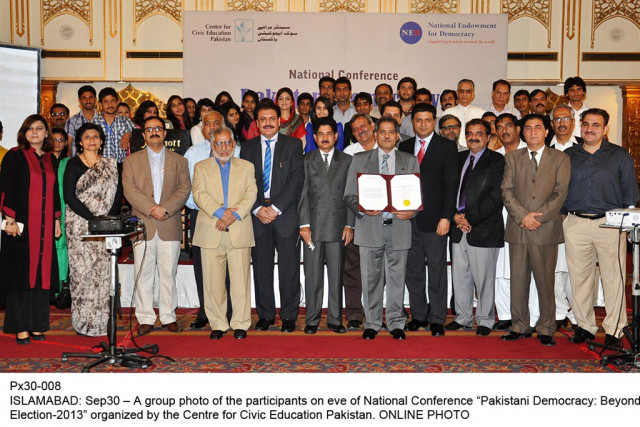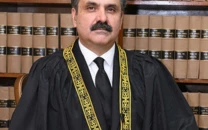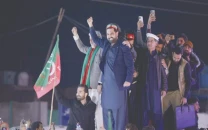Beyond polls: Future of democracy linked to electoral reforms
Many lessons are to be learnt from the 2013 elections.

A group photo of the participants of the national conference on "Pakistani Democracy: Beyond Election-2013", organised by the centre for civic education Pakistan. PHOTO: ONLINE
Participants of a conference here on Monday called for equitable distribution of wealth, fresh census and electoral reforms to ensure participation of common man in electoral process and cut in expenditure on campaigning.
“Some parties use money while others use criminal elements to gain power,” Jami Chandio, Executive Director of the Centre for Peace and Civil Society (CPCS) said while speaking at the conference on “Pakistan Democracy: Beyond 2013’
The conference was organised by Centre for Civic Education Pakistan (CCEP) in collaboration with National Endowment for Democracy (NED).

The participants recommended various steps for the continuity of democracy in Pakistan.
They identified gaps and challenges that the country might face after its historic first civilian to civilian power transition.
A number of lessons learnt were recognized during the conference.
Chandio suggested the development of a mechanism to monitor political parties’ spending on election campaigns.
Agreeing with Chandio, the CCEP Director Zafarullah Khan said “Rules were clearly violated during the general elections”. He feared “The lack of participation of the common citizen due to structures made by ruling elites could result in the derailing of democracy yet again.”
He, however, said the participation of 55 per cent of the 86 million voters in the process, enthusiastic role of political parties, better computerized electoral rolls and innovative use of technology like the software for thumb impression verification were the golden gains of elections.

Khan said, there was still a room for improvement in the process which could have been achieved by taking measures against violence, introduction of security marked ballot papers and establishment of an effective system to address complaints.
National Database and Registration Authority (NADRA) chairman Tariq Malik informed the participants about a code of conduct formulated by the authority for its employees associated with electoral process.
“Through learning from the exercise of election 2013, we can improve our electoral system accordingly and avoid committing the same mistakes in future,” he said.
“As accountability remains weak in the country, parties consider spending on elections as an investment, which is reimbursed when they gain power,” said National Party Representative, Ishaq Baloch who suggested that the election commission should disqualify the violators of the rules.
According to him, polling stations should be set up at permanent locations for voters’ convenience.
In its recommendations, the CCEP suggested that political parties in and outside the parliament must give top priority to the long awaited electoral reforms and in order to fairly and equitably distribute the country’s political wealth, a population census — due since 2008 — must be held immediately. The Terms of Reference defining the role of caretaker setups must also be revisited and a culture emphasizing the need for referring to studies conducted on these issues must be created to develop democracy consensus for better policy making.
Published in The Express Tribune, October 1st, 2013.



















COMMENTS
Comments are moderated and generally will be posted if they are on-topic and not abusive.
For more information, please see our Comments FAQ